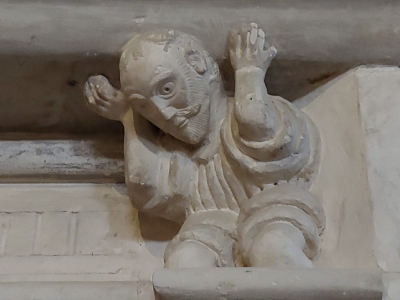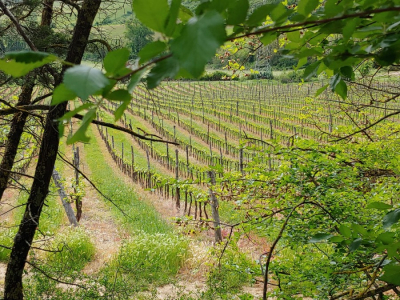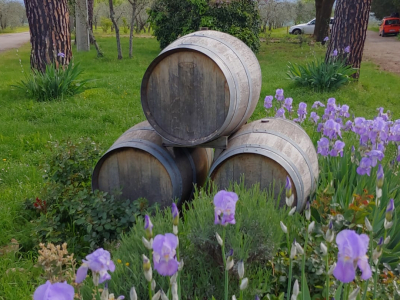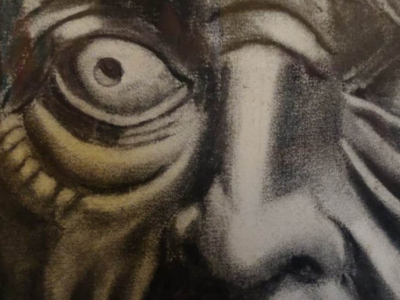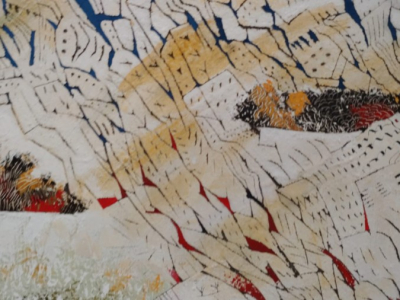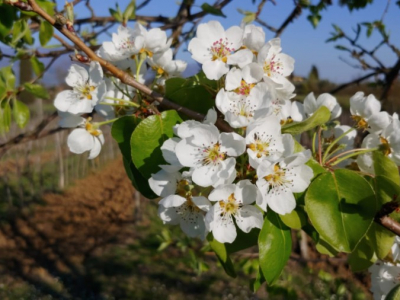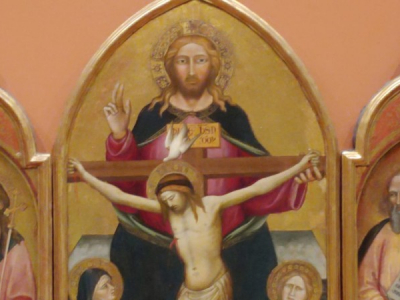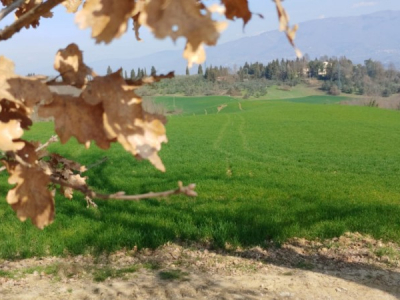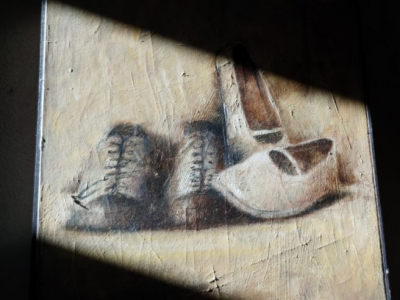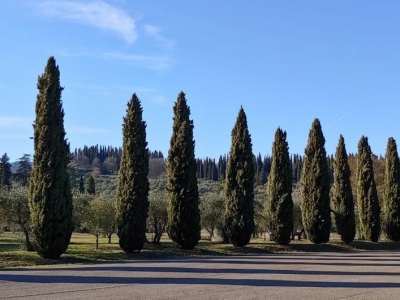stdClass Object
(
[id] => 16212
[title] => And so paradise became a city
[alias] => and-so-paradise-became-a-city
[introtext] => The exile and the promise/28 – There is always a piece of sacred land that is not for sale, and hence priceless
by Luigino Bruni
published in Avvenire on 19/05/2019
«The price of life stems from things that are priceless. It is within the context of charitable acts, of giving away what he owns and what he is, that man reaches his highest level of dignity»
François Perroux, Le capitalisme
We have reached the end of the comments on the book of Ezekiel. His last words regard the city, reminding us that the meaning of prophecy is to talk to us about heaven in order to do things better on earth.
He who fears charity and giving does not seek, in general, to do away with them. No, instead he cunningly covers them with words of esteem and praise and then locks them away in a small and narrow room, so that, tied up and imprisoned, they cannot disturb the regular business of things going on outside. The name of these attempts at ideological confinement today are: no profit, volunteering, third sector, religion. There are false prophets who are willing to do everything to convince us that giving and fraternity can only be good and of use if the remain docile within the realms of a well-defined and limited territory, because they know that if these concepts should free themselves and get out, they would put their business in a profound crisis. Great innovations come about when, thanks to an honest prophet, charity exceeds its boundaries and breaks into the city, transforming and changing it forever.
«This is what the Sovereign Lord says: “You are to divide it equally among them. Because I swore with uplifted hand to give it to your ancestors, this land will become your inheritance» (Ezekiel 47,13-14). At the end of the book of Ezekiel we find the land again, which in the Bible is much more than a mere juridical or political issue. To the prophets the land is always sacred land, especially to the prophets of the exile, when land was no more and the promise seemed to have vanished forever. One of the great and principal tasks of the prophets, maybe the most precious one, is keeping the promise alive when everyone and everything insist that it’s finished – talking to us about the future during destruction, of beauty in the middle of ugliness, of health in sickness, of life while we are dying. One cannot overcome the great crises of the world without prophecy.
The Promised Land belongs to the profound spiritual DNA of biblical humanism. It is an essential part of the gift from its different God, true because of the truth of His promise. This is also why the Jewish people have been (and continue to be) tempted and tried on their possession and non-possession of land. But the view of the prophets differs from that of the Law regarding this matter as well. Ezekiel says that the portions of land of the twelve tribes must all be the equal, and hence that they should not be assigned according to the size of the population. Telling us that if there is justice in proportionality, there is also a different kind of justice that recognises equal rights to different realities. Being smaller or a smaller number of people does not always justify a smaller share, because sometimes size and force are not the first words to be mentioned in the social pact. They are many times, but not always. There are moral and social aspects that cannot be measured or weighed. Sometimes the criteria for fair treatment and equity precede those of equality, but there are times when the principle of equality must be absolute, especially in matters regarding human rights – dignity, respect, freedom, are not assigned on the basis of quantity and numbers. And to the prophets the Promised Land does not belong to the kingdom of quantity but to that of the spirit and hence of quality.
The Law had also repeatedly stated that foreigners were not like the Jews, that they did not have the same rights (Deuteronomy 23, 3-4).The prophet however changes, rectifies and overturns this: «So you shall divide this land among you according to the tribes of Israel. You shall allot it as an inheritance for yourselves and for the sojourners who reside among you and have had children among you. They shall be to you as native-born children of Israel» (Ezekiel 47, 21-22). The Torah Law relegates the different rules regarding the seventh day to the Shabbat alone, doing everything possible so that they may continue being only an exception, prophecy however tends to extend the jubilee law of the seventh day to every day of the week. Because the sabbatical exception to the Law is and must remain an exception (equality between citizens and foreigners, between man and nature, between free men and slaves…), while to the prophecy this is the rule of the Kingdom that is to come. Jesus’s controversy towards the Sabbath is a prophetic criticism of a system which jealously defended the Sabbath to stop it from eluding the boundaries of the seventh day – the prophecy of the Gospels is an eternal Sabbath, where cosmic fraternity is the golden rule of the new law.
Communities that do not have prophets or prophecies discriminate between native citizens and foreigners, between different categories of children. The Law makes distinctions, assigns priorities and excludes; in the name of a different law, the prophets unify, include, level and bring equality. It is from the dialogue, meeting and confrontation between the Law and Prophecy that the actual and changing rules of civil society and coexistence were born. But these will not be anything but inhuman and unjust if the different reasoning behind the prophets thinking is missing in the civil debate – or when it is silenced, killed, or converted.
Ezekiel then continues: «Alongside the territory of the priests, the Levites will have an allotment (…) They must not sell or exchange any of it. This is the best of the land and must not pass into other hands, because it is holy to the Lord» (Ezekiel 48,13-14). There is a portion of the Promised Land, the central part is assigned to the tribe of Levi, which is governed by yet another different statute: this strip of land cannot be made an object of trade. Here, the land does not follow the rules of supply and demand, and hence, thanks to this sliver of land the entire earth still remains promised even if it’s already been attained.
This land is not the land of a contract but of a pact it needs to remember. A strong and clear language to differentiate between pacts and contracts and set a limit to commercial exchange, stating that not everything in that relationship is for sale, that there in fact are things and values that are literally non-negotiable. In the Bible business is not, as in Latin languages, the negative of ozio = leisure, (nec-otium), but the negative of sacred: “because it is sacred to the Lord”. A pact is not a contract because it does not include a reserved price which once attained will turn the good in question into a commodity. Even if some lawyer wanted to call it that, a matrimony is not a business transaction for it is founded on a piece of sacred land that is not a commodity, but merely and only a good; because that strip of common land is our promised land, and hence does not have a price, and that lack of price makes its value infinite.
Ezekiel’s last vision ends with the New Jerusalem: «The gates of the city will be named after the tribes of Israel» (Ezekiel 48, 31). And then the book ends with this phrase: «And the name of the city from that time on will be: the Lord is there» (Ezekiel 48, 35).
The book of the prophet Ezekiel, the prophet who spoke to us about heaven the most, of visions, of angels, ends with the vision of a new city. In great novels, the first and last words are not like the rest. They have a different weight and a different meaning, and they should often be read together. «In my thirtieth year, in the fourth month on the fifth day, while I was among the exiles by the Kebar River, the heavens were opened and I saw visions of God». This is the first verse of the book of Ezekiel, with which we began this long journey, almost six months ago. The heavens opened, and there were divine visions, many of which are described in his book. And, in the end, his last word is a secular and humble word: “city”. These last couple of months, Ezekiel has given us a great number of words of beauty and hope, but maybe the most beautiful one is this one last word of his. A marvellous message to those who, like us, do not have the privilege to see the heavens opening, do not have visions, but wish to and should see the city, our city, its politics, its economy, its people, therein finding our paradise. Ezekiel’s visions and heavens have at the same time also become ours. The prophets tell us of their visions so that they may become our heritage and hope while we fight the same battles they fought, despite note being able to hear “so said the Lord”. Here, we have a strange but real legacy: continuing their fights without having their light, creates a real fraternity between us and the prophets.
And so the time to say goodbye is upon us once again. We must leave Ezekiel, with the same nostalgic feeling with which we leave a dear friend who has welcomed us as guests during a few months in his beautiful home. In his company, we have encountered both the lights and shadows of our time, its joys and its hopes. Many things remain engraved in our soul, but above all, a few immense and infinite pages. The story of his prophetic calling in exiled lands, a minister without a temple who inherits a temple as great as the whole world. The silence that accompanied his calling and made it even more real and human, because no one knows himself to own his own words like a prophet does, that each word is a gift that breaks the silence. And then the destruction of Jerusalem and of the temple, that he had prophesized from the very first day of his calling: a mysterious destiny for a prophet who received the task to announce the destruction of the holy city, “delight of his eyes”. Then, the new heart of flesh, and the great vision of the withered and resurrected bones, the Pentecost of the Old Testament. And then the new temple which becomes the fountain and a source of water that spreads from there to inundate the earth, to sanctify the profane and the whole world. And finally the city. His and our cities. But first, last and always: the exile and the promise. Ezekiel is an incredible prophet because he knew how to keep his faith in the promise constant during the Babylonian exile, the hardest time in the history of Israel. Teaching us that the promise can be kept alive even when the great dream is dying. That God is still real even if He has been beaten, that success is not a good indicator of truth. That even if a story has ended it does not mean that it is the end of the story. What would religion be without the prophets? Without life? Without us?
Thank you to those of you who have accompanied me during these months, in an assignment that keeps becoming increasingly choral. Thank you to Marco Tarquinio, director of this publication which is one of the great blessings of this season of my work and of my life. Following a Sunday break, we will continue our dialogue with the Bible on the 2nd of June, with a comment on the Books of Kings, hence on the story of Solomon and Elia. Once more, ready to allow ourselves to be surprised by the Bible and through it by life.
download
pdf
article in pdf
(311 KB)
[fulltext] =>
[checked_out] => 0
[checked_out_time] => 0000-00-00 00:00:00
[catid] => 873
[created] => 2019-05-18 17:13:03
[created_by] => 64
[created_by_alias] => Luigino Bruni
[state] => 1
[modified] => 2020-08-23 18:40:21
[modified_by] => 609
[modified_by_name] => Super User
[publish_up] => 2019-06-05 01:00:03
[publish_down] => 0000-00-00 00:00:00
[images] => {"image_intro":"","float_intro":"","image_intro_alt":"","image_intro_caption":"","image_fulltext":"","float_fulltext":"","image_fulltext_alt":"","image_fulltext_caption":""}
[urls] => {"urla":false,"urlatext":"","targeta":"","urlb":false,"urlbtext":"","targetb":"","urlc":false,"urlctext":"","targetc":""}
[attribs] => {"article_layout":"","show_title":"","link_titles":"","show_tags":"","show_intro":"","info_block_position":"","info_block_show_title":"","show_category":"","link_category":"","show_parent_category":"","link_parent_category":"","show_associations":"","show_author":"","link_author":"","show_create_date":"","show_modify_date":"","show_publish_date":"","show_item_navigation":"","show_icons":"","show_print_icon":"","show_email_icon":"","show_vote":"","show_hits":"","show_noauth":"","urls_position":"","alternative_readmore":"","article_page_title":"","show_publishing_options":"","show_article_options":"","show_urls_images_backend":"","show_urls_images_frontend":"","helix_ultimate_image":"images\/2019\/05\/18\/Ezechiele_28.jpg","helix_ultimate_image_alt_txt":"","helix_ultimate_article_format":"standard","gallery":"","helix_ultimate_audio":"","helix_ultimate_video":"","link_title":"","link_url":"","quote_text":"","quote_author":"","post_status":""}
[metadata] => {"robots":"","author":"","rights":"","xreference":""}
[metakey] =>
[metadesc] =>
[access] => 1
[hits] => 1866
[xreference] =>
[featured] => 0
[language] => en-GB
[on_img_default] =>
[readmore] => 0
[ordering] => 1
[category_title] => EN - The exile and the promise
[category_route] => commenti-biblici/serie-bibliche/it-l-esilio-e-la-promessa
[category_access] => 1
[category_alias] => en-the-exile-and-the-promise
[published] => 1
[parents_published] => 1
[lft] => 131
[author] => Luigino Bruni
[author_email] => ferrucci.anto@gmail.com
[parent_title] => IT - Serie bibliche
[parent_id] => 773
[parent_route] => commenti-biblici/serie-bibliche
[parent_alias] => serie-bibliche
[rating] => 0
[rating_count] => 0
[alternative_readmore] =>
[layout] =>
[params] => Joomla\Registry\Registry Object
(
[data:protected] => stdClass Object
(
[article_layout] => _:default
[show_title] => 1
[link_titles] => 1
[show_intro] => 1
[info_block_position] => 0
[info_block_show_title] => 1
[show_category] => 1
[link_category] => 1
[show_parent_category] => 1
[link_parent_category] => 1
[show_associations] => 0
[flags] => 1
[show_author] => 0
[link_author] => 0
[show_create_date] => 1
[show_modify_date] => 0
[show_publish_date] => 1
[show_item_navigation] => 1
[show_vote] => 0
[show_readmore] => 0
[show_readmore_title] => 0
[readmore_limit] => 100
[show_tags] => 1
[show_icons] => 1
[show_print_icon] => 1
[show_email_icon] => 1
[show_hits] => 0
[record_hits] => 1
[show_noauth] => 0
[urls_position] => 1
[captcha] =>
[show_publishing_options] => 1
[show_article_options] => 1
[save_history] => 1
[history_limit] => 10
[show_urls_images_frontend] => 0
[show_urls_images_backend] => 1
[targeta] => 0
[targetb] => 0
[targetc] => 0
[float_intro] => left
[float_fulltext] => left
[category_layout] => _:blog
[show_category_heading_title_text] => 0
[show_category_title] => 0
[show_description] => 0
[show_description_image] => 0
[maxLevel] => 0
[show_empty_categories] => 0
[show_no_articles] => 1
[show_subcat_desc] => 0
[show_cat_num_articles] => 0
[show_cat_tags] => 1
[show_base_description] => 1
[maxLevelcat] => -1
[show_empty_categories_cat] => 0
[show_subcat_desc_cat] => 0
[show_cat_num_articles_cat] => 0
[num_leading_articles] => 0
[num_intro_articles] => 14
[num_columns] => 2
[num_links] => 0
[multi_column_order] => 1
[show_subcategory_content] => -1
[show_pagination_limit] => 1
[filter_field] => hide
[show_headings] => 1
[list_show_date] => 0
[date_format] =>
[list_show_hits] => 1
[list_show_author] => 1
[list_show_votes] => 0
[list_show_ratings] => 0
[orderby_pri] => none
[orderby_sec] => rdate
[order_date] => published
[show_pagination] => 2
[show_pagination_results] => 1
[show_featured] => show
[show_feed_link] => 1
[feed_summary] => 0
[feed_show_readmore] => 0
[sef_advanced] => 1
[sef_ids] => 1
[custom_fields_enable] => 1
[show_page_heading] => 0
[layout_type] => blog
[menu_text] => 1
[menu_show] => 1
[secure] => 0
[helixultimatemenulayout] => {"width":600,"menualign":"right","megamenu":0,"showtitle":1,"faicon":"","customclass":"","dropdown":"right","badge":"","badge_position":"","badge_bg_color":"","badge_text_color":"","layout":[]}
[helixultimate_enable_page_title] => 1
[helixultimate_page_title_alt] => Le levatrici d'Egitto
[helixultimate_page_subtitle] => Commenti Biblici
[helixultimate_page_title_heading] => h2
[page_title] => The exile and the promise
[page_description] =>
[page_rights] =>
[robots] =>
[access-view] => 1
)
[initialized:protected] => 1
[separator] => .
)
[displayDate] => 2019-05-18 17:13:03
[tags] => Joomla\CMS\Helper\TagsHelper Object
(
[tagsChanged:protected] =>
[replaceTags:protected] =>
[typeAlias] =>
[itemTags] => Array
(
[0] => stdClass Object
(
[tag_id] => 31
[id] => 31
[parent_id] => 1
[lft] => 59
[rgt] => 60
[level] => 1
[path] => l-esilio-e-la-promessa
[title] => L'esilio e la promessa
[alias] => l-esilio-e-la-promessa
[note] =>
[description] =>
[published] => 1
[checked_out] => 0
[checked_out_time] => 0000-00-00 00:00:00
[access] => 1
[params] => {}
[metadesc] =>
[metakey] =>
[metadata] => {}
[created_user_id] => 609
[created_time] => 2018-12-30 06:29:16
[created_by_alias] =>
[modified_user_id] => 0
[modified_time] => 2020-08-10 04:38:16
[images] => {}
[urls] => {}
[hits] => 12744
[language] => *
[version] => 1
[publish_up] => 2018-12-30 06:29:16
[publish_down] => 2018-12-30 06:29:16
)
)
)
[slug] => 16212:and-so-paradise-became-a-city
[parent_slug] => 773:serie-bibliche
[catslug] => 873:en-the-exile-and-the-promise
[event] => stdClass Object
(
[afterDisplayTitle] =>
[beforeDisplayContent] =>
[afterDisplayContent] =>
)
[text] => The exile and the promise/28 – There is always a piece of sacred land that is not for sale, and hence priceless
by Luigino Bruni
published in Avvenire on 19/05/2019
«The price of life stems from things that are priceless. It is within the context of charitable acts, of giving away what he owns and what he is, that man reaches his highest level of dignity»
François Perroux, Le capitalisme
We have reached the end of the comments on the book of Ezekiel. His last words regard the city, reminding us that the meaning of prophecy is to talk to us about heaven in order to do things better on earth.
He who fears charity and giving does not seek, in general, to do away with them. No, instead he cunningly covers them with words of esteem and praise and then locks them away in a small and narrow room, so that, tied up and imprisoned, they cannot disturb the regular business of things going on outside. The name of these attempts at ideological confinement today are: no profit, volunteering, third sector, religion. There are false prophets who are willing to do everything to convince us that giving and fraternity can only be good and of use if the remain docile within the realms of a well-defined and limited territory, because they know that if these concepts should free themselves and get out, they would put their business in a profound crisis. Great innovations come about when, thanks to an honest prophet, charity exceeds its boundaries and breaks into the city, transforming and changing it forever.
«This is what the Sovereign Lord says: “You are to divide it equally among them. Because I swore with uplifted hand to give it to your ancestors, this land will become your inheritance» (Ezekiel 47,13-14). At the end of the book of Ezekiel we find the land again, which in the Bible is much more than a mere juridical or political issue. To the prophets the land is always sacred land, especially to the prophets of the exile, when land was no more and the promise seemed to have vanished forever. One of the great and principal tasks of the prophets, maybe the most precious one, is keeping the promise alive when everyone and everything insist that it’s finished – talking to us about the future during destruction, of beauty in the middle of ugliness, of health in sickness, of life while we are dying. One cannot overcome the great crises of the world without prophecy.
The Promised Land belongs to the profound spiritual DNA of biblical humanism. It is an essential part of the gift from its different God, true because of the truth of His promise. This is also why the Jewish people have been (and continue to be) tempted and tried on their possession and non-possession of land. But the view of the prophets differs from that of the Law regarding this matter as well. Ezekiel says that the portions of land of the twelve tribes must all be the equal, and hence that they should not be assigned according to the size of the population. Telling us that if there is justice in proportionality, there is also a different kind of justice that recognises equal rights to different realities. Being smaller or a smaller number of people does not always justify a smaller share, because sometimes size and force are not the first words to be mentioned in the social pact. They are many times, but not always. There are moral and social aspects that cannot be measured or weighed. Sometimes the criteria for fair treatment and equity precede those of equality, but there are times when the principle of equality must be absolute, especially in matters regarding human rights – dignity, respect, freedom, are not assigned on the basis of quantity and numbers. And to the prophets the Promised Land does not belong to the kingdom of quantity but to that of the spirit and hence of quality.
The Law had also repeatedly stated that foreigners were not like the Jews, that they did not have the same rights (Deuteronomy 23, 3-4).The prophet however changes, rectifies and overturns this: «So you shall divide this land among you according to the tribes of Israel. You shall allot it as an inheritance for yourselves and for the sojourners who reside among you and have had children among you. They shall be to you as native-born children of Israel» (Ezekiel 47, 21-22). The Torah Law relegates the different rules regarding the seventh day to the Shabbat alone, doing everything possible so that they may continue being only an exception, prophecy however tends to extend the jubilee law of the seventh day to every day of the week. Because the sabbatical exception to the Law is and must remain an exception (equality between citizens and foreigners, between man and nature, between free men and slaves…), while to the prophecy this is the rule of the Kingdom that is to come. Jesus’s controversy towards the Sabbath is a prophetic criticism of a system which jealously defended the Sabbath to stop it from eluding the boundaries of the seventh day – the prophecy of the Gospels is an eternal Sabbath, where cosmic fraternity is the golden rule of the new law.
Communities that do not have prophets or prophecies discriminate between native citizens and foreigners, between different categories of children. The Law makes distinctions, assigns priorities and excludes; in the name of a different law, the prophets unify, include, level and bring equality. It is from the dialogue, meeting and confrontation between the Law and Prophecy that the actual and changing rules of civil society and coexistence were born. But these will not be anything but inhuman and unjust if the different reasoning behind the prophets thinking is missing in the civil debate – or when it is silenced, killed, or converted.
Ezekiel then continues: «Alongside the territory of the priests, the Levites will have an allotment (…) They must not sell or exchange any of it. This is the best of the land and must not pass into other hands, because it is holy to the Lord» (Ezekiel 48,13-14). There is a portion of the Promised Land, the central part is assigned to the tribe of Levi, which is governed by yet another different statute: this strip of land cannot be made an object of trade. Here, the land does not follow the rules of supply and demand, and hence, thanks to this sliver of land the entire earth still remains promised even if it’s already been attained.
This land is not the land of a contract but of a pact it needs to remember. A strong and clear language to differentiate between pacts and contracts and set a limit to commercial exchange, stating that not everything in that relationship is for sale, that there in fact are things and values that are literally non-negotiable. In the Bible business is not, as in Latin languages, the negative of ozio = leisure, (nec-otium), but the negative of sacred: “because it is sacred to the Lord”. A pact is not a contract because it does not include a reserved price which once attained will turn the good in question into a commodity. Even if some lawyer wanted to call it that, a matrimony is not a business transaction for it is founded on a piece of sacred land that is not a commodity, but merely and only a good; because that strip of common land is our promised land, and hence does not have a price, and that lack of price makes its value infinite.
Ezekiel’s last vision ends with the New Jerusalem: «The gates of the city will be named after the tribes of Israel» (Ezekiel 48, 31). And then the book ends with this phrase: «And the name of the city from that time on will be: the Lord is there» (Ezekiel 48, 35).
The book of the prophet Ezekiel, the prophet who spoke to us about heaven the most, of visions, of angels, ends with the vision of a new city. In great novels, the first and last words are not like the rest. They have a different weight and a different meaning, and they should often be read together. «In my thirtieth year, in the fourth month on the fifth day, while I was among the exiles by the Kebar River, the heavens were opened and I saw visions of God». This is the first verse of the book of Ezekiel, with which we began this long journey, almost six months ago. The heavens opened, and there were divine visions, many of which are described in his book. And, in the end, his last word is a secular and humble word: “city”. These last couple of months, Ezekiel has given us a great number of words of beauty and hope, but maybe the most beautiful one is this one last word of his. A marvellous message to those who, like us, do not have the privilege to see the heavens opening, do not have visions, but wish to and should see the city, our city, its politics, its economy, its people, therein finding our paradise. Ezekiel’s visions and heavens have at the same time also become ours. The prophets tell us of their visions so that they may become our heritage and hope while we fight the same battles they fought, despite note being able to hear “so said the Lord”. Here, we have a strange but real legacy: continuing their fights without having their light, creates a real fraternity between us and the prophets.
And so the time to say goodbye is upon us once again. We must leave Ezekiel, with the same nostalgic feeling with which we leave a dear friend who has welcomed us as guests during a few months in his beautiful home. In his company, we have encountered both the lights and shadows of our time, its joys and its hopes. Many things remain engraved in our soul, but above all, a few immense and infinite pages. The story of his prophetic calling in exiled lands, a minister without a temple who inherits a temple as great as the whole world. The silence that accompanied his calling and made it even more real and human, because no one knows himself to own his own words like a prophet does, that each word is a gift that breaks the silence. And then the destruction of Jerusalem and of the temple, that he had prophesized from the very first day of his calling: a mysterious destiny for a prophet who received the task to announce the destruction of the holy city, “delight of his eyes”. Then, the new heart of flesh, and the great vision of the withered and resurrected bones, the Pentecost of the Old Testament. And then the new temple which becomes the fountain and a source of water that spreads from there to inundate the earth, to sanctify the profane and the whole world. And finally the city. His and our cities. But first, last and always: the exile and the promise. Ezekiel is an incredible prophet because he knew how to keep his faith in the promise constant during the Babylonian exile, the hardest time in the history of Israel. Teaching us that the promise can be kept alive even when the great dream is dying. That God is still real even if He has been beaten, that success is not a good indicator of truth. That even if a story has ended it does not mean that it is the end of the story. What would religion be without the prophets? Without life? Without us?
Thank you to those of you who have accompanied me during these months, in an assignment that keeps becoming increasingly choral. Thank you to Marco Tarquinio, director of this publication which is one of the great blessings of this season of my work and of my life. Following a Sunday break, we will continue our dialogue with the Bible on the 2nd of June, with a comment on the Books of Kings, hence on the story of Solomon and Elia. Once more, ready to allow ourselves to be surprised by the Bible and through it by life.
download
pdf
article in pdf
(311 KB)
[jcfields] => Array
(
)
[type] => intro
[oddeven] => item-odd
)
